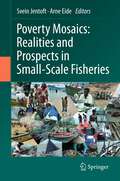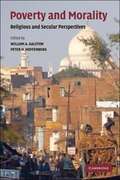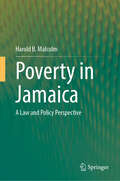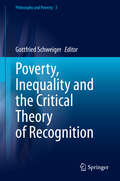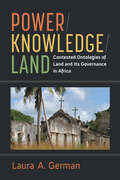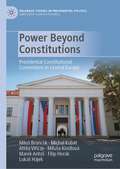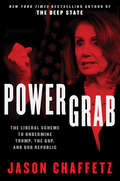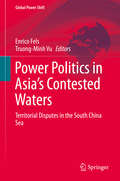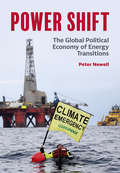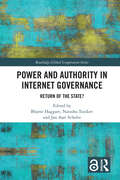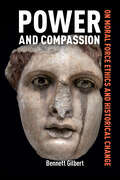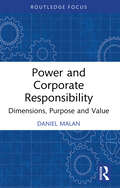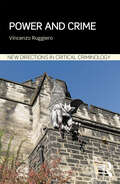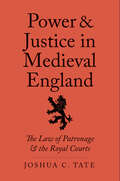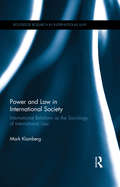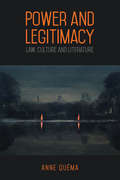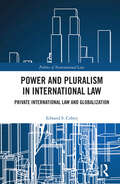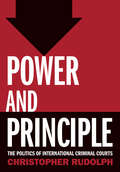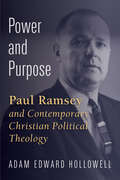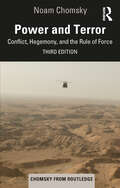- Table View
- List View
Poverty Law and Social Change: The Story of the Fitzroy Legal Service
by John Chesterman'Law for the Poor' and 'Lawyers for the People' declared the headlines that announced the opening of the Fitzroy Legal Service in December 1972. In a dingy town-hall basement in one of the poorest suburbs of Melbourne, this new legal service set out to do the unthinkable: to provide free legal advice to all comers. Almost a quarter of a century later, under an equally radical Liberal government, the Fitzroy Legal Service has found itself cast in the unlikely role of a defender of the status quo against reforms that threaten judicial independence and restrict the availability of legal aid. John Chesterman traces the evolution of the Fitzroy Legal Service from a thorn in the side of the legal profession to a valued contributor to legal debate. In this process, he provides an entertaining and perceptive account of the forces that have prompted legal reform in Australia from the early 1970s, particularly in the development of legal aid.
Poverty Mosaics: Realities and Prospects in Small-Scale Fisheries
by Svein Jentoft Arne EideSmall-scale fisheries are a major source of food and employment around the world. Yet, many small-scale fishers work in conditions that are neither safe nor secure. Millions of them are poor, and often they are socially and politically marginalized. Macro-economic and institutional mechanisms are essential to address these poverty and vulnerability problems; however, interventions at the local community level are also necessary. This requires deep understanding of what poverty means to the fishers, their families and communities; how they cope with it; and the challenges they face to increase resiliency and improve their lives for the better. This book provides a global perspective, situating small-scale fisheries within the broad academic discourse on poverty, fisheries management and development. In-depth case studies from fifteen countries in Latin America, Europe, South and Southeast Asia, and sub-Saharan Africa, demonstrate the enormously complex ecological, economic, social, cultural and political contexts of this sector. Conclusions for policy-making, formulated as a joint statement by the authors, argue that fisheries development, poverty alleviation, and resource management must be integrated within a comprehensive governance approach that also looks beyond fisheries. The scientific editors, Svein Jentoft and Arne Eide, are both with the Norwegian College of Fishery Science, Faculty of Biosciences, Fisheries and Economics, University of Tromsø, Norway.
Poverty and Morality
by William A. Galston Peter H. HoffenbergThis multi-authored book explores the ways that many influential ethical traditions - secular and religious, Western and non-Western - wrestle with the moral dimensions of poverty and the needs of the poor. These traditions include Buddhism, Christianity, Confucianism, Hinduism, Islam, and Judaism, among the religious perspectives; classical liberalism, feminism, liberal-egalitarianism, and Marxism, among the secular; and natural law, which might be claimed by both. The basic questions addressed by each of these traditions are linked to several overarching themes: what poverty is, the particular vulnerabilities of high-risk groups, responsibility for the occurrence of poverty, preferred remedies, how responsibility for its alleviation is distributed, and priorities in the delivery of assistance. This volume features an introduction to the types, scope, and causes of poverty in the modern world and concludes with Michael Walzer's broadly conceived commentary, which provides a direct comparison of the presented views and makes suggestions for further study and policy.
Poverty and the International Economic Legal System
by Krista Nadakavukaren ScheferWith a focus on how trade, foreign investment, commercial arbitration and financial regulation rules affect impoverished individuals, Poverty and the International Economic Legal System examines the relationship between the legal rules of the international economic law system and states' obligations to reduce poverty. The contributors include leading practitioners, practice-oriented scholars and legal theorists, who discuss the human aspects of global economic activity without resorting to either overly dogmatic human rights approaches or technocratic economic views. The essays extend beyond development discussions by encouraging further efforts to study, improve and develop legal mechanisms for the benefit of the world's poor and challenging traditionally de-personified legal areas to engage with their real-world impacts.
Poverty in Jamaica: A Law and Policy Perspective
by Harold B. MalcolmThis book examines the genesis of poverty in Jamaica and how policies and laws related to social and economic rights can help with the promotion and protection of human rights as part of a broader worldview of human dignity. It explores the scope of the country’s obligations and capabilities in line with its municipal and international obligations. It sets out through the policy lenses of the New Haven School of Jurisprudence to understand how Jamaica can fulfil these obligations in a meaningful way to impact the daily lives of its people. Through a historical survey to the present-day Jamaica, the exploration uses the theoretical frame of the New Haven School of Jurisprudence which underscores human dignity as being paramount to the attainment of human progress and development. The trajectory of the modern human rights movement and constitutional apparatus of nation states help to reinforce and entrench the ways, standards and norms relating to social and economic rights are observed. This, too, is a consideration for this small island state in the Northern Caribbean. However, the jurisprudential question is how the interpretation of laws, and the implementation of policies can be synchronized as conditioning factors of a global consensus on human dignity especially for the most vulnerable. Socio economic rights underscore a public morality though their potential enforcement is often criticized as too vague and imprecise for lasting or meaningful effect. The New Haven School of Jurisprudence with its emphasis on human dignity in the world community points to a new approach to the egregious human rights violations caused by poverty and the part played by these second-generation rights. The book combines academic rigor with substantial hands-on legal experience, and will be of interest to scholars, practitioners, and policymakers focused on human rights in the region.
Poverty, Inequality and the Critical Theory of Recognition (Philosophy and Poverty #3)
by Gottfried SchweigerThis book brings together philosophical approaches to explore the relation of recognition and poverty. This volume examines how critical theories of recognition can be utilized to enhance our understanding, evaluation and critique of poverty and social inequalities. Furthermore, chapters in this book explore anti-poverty policies, development aid and duties towards the (global) poor. This book includes critical examinations of reflections on poverty and related issues in the work of past and present philosophers of recognition. This book hopes to contribute to the ongoing and expanding debate on recognition in ethics, political and social philosophy by focusing on poverty, which is one highly important social and global challenge.“If one believed that the theme of “recognition” had been theoretically exhausted over the last couple of years, this book sets the record straight. The central point of all the studies collected here is that poverty is best understood in its social causes, psychic consequences and moral injustice when studied within the framework of recognition theory. Regardless of how recognition is defined in detail, poverty is best captured as the absence of all material and cultural conditions for being recognized as a human being. Whoever is interested in the many facets of poverty is well advised to consult this path-breaking book.” Axel Honneth, Columbia University.
Powell9;]Smith and Furmston's Building Contract Casebook
by Michael FurmstonThe interaction between general principles and the provisions of the standard building and construction contracts is a central feature of construction law. The major part of the law is laid down in decided cases, and construction professionals should be familiar with these cases but the information is scattered throughout a large number of law reports. The fifth edition of Powell Smith and Furmston's Building Contract Casebook is designed to help construction professionals become familiar with those key cases. It brings together a wide range of cases on the main aspects of the law of construction contracts, states the principle established by each case and gives a summary of the facts and the decision. For the majority of cases, verbatim extracts from the judgment are included. The casebook presents the leading cases on each topic, together with many lesser-known but important decisions. A number of useful decisions from the Commonwealth are also included. Throughout, the author's approach is practical rather than academic.
Power / Knowledge / Land: Contested Ontologies of Land and Its Governance in Africa (African Perspectives)
by Laura GermanThe 2008 outcry over the “global land grab” made headlines around the world, leading to a sustained interest in the dynamics and fate of customary land among both academics and development practitioners. In Power/Knowledge/Land, author Laura German profiles the consolidation of a global knowledge regime surrounding land and its governance within international development circles in the decade following this outcry, and the growing enrollment of previously antagonistic actors within it. Drawing theoretical insights on the inseparability of power and knowledge, German reveals the dynamics of knowledge practices that have enabled the longstanding project of commodifying customary land – and the more contemporary interests in acquiring and financializing it – to be advanced and legitimated by capturing the energies of socially progressive forces. By bringing theories of change from the emergent land governance orthodoxy into dialogue with the ethnographic evidence from across the African continent and beyond, concepts masquerading as universal and self-evident truths are provincialized, and their role in commodifying customary land and entrenching colonial futurities put on display. In doing so, the volume brings wider academic debates surrounding productive forms of power into the heart of the land grab debate, while enhancing their accessibility to a wider audience. Power/Knowledge/Land takes current scholarly debates surrounding land grabs beyond their theoretical moorings in critical agrarian studies, political economy and globalization into contemporary debates surrounding the politics of knowledge—from theories of coloniality to ontological anthropology, thereby enabling new dynamics of the phenomenon to be revealed. The book deploys a pioneering epistemology integrating deconstructionist approaches (to reveal the tactics, truth claims and ontological assumptions of global knowledge brokers), with systematic qualitative reviews and comparative study (to contrast these dominant constructs with the evidence and reveal alternative ways of knowing “land” and practicing “security” from the ethnographic literature). This helps to reveal the Western and modernist biases in the narratives that have been advanced about women, custom, and security, revealing how the coloniality of knowledge works to grease the wheels of land takings by advancing highly provincialized constructs aligned with western interests as universal truths.
Power Beyond Constitutions: Presidential Constitutional Conventions in Central Europe (Palgrave Studies in Presidential Politics)
by Miloš Brunclík Michal Kubát Attila Vincze Miluše Kindlová Marek Antoš Filip Horák Lukáš HájekThis research monograph examines presidential constitutional conventions and the role they play in the political systems of four Central European countries – the Czech Republic, Slovakia, Hungary, and Poland. As primarily unwritten rules of constitutional practice, constitutional conventions represent political arrangements and as such are political in origin. Not only this, constitutional conventions, in general, and presidential constitutional conventions, in particular, have significant political implications. They shape both the everyday operation and character of regimes. Central Europe represents a particularly useful example on which this role of constitutional conventions can be studied and assessed.
Power Failure: The Inside Story Of The Collapse Of Enron
by Mimi Swartz Sherron Watkins"They're still trying to hide the weenie," thought Sherron Watkins as she read a newspaper clipping about Enron two weeks before Christmas, 2001. . . It quoted [CFO] Jeff McMahon addressing the company's creditors and cautioning them against a rash judgment. "Don't assume that there is a smoking gun. " Sherron knew Enron well enough to know that the company was in extreme spin mode... Power Failure is the electrifying behind-the-scenes story of the collapse of Enron, the high-flying gas and energy company touted as the poster child of the New Economy that, in its hubris, had aspired to be "The World's Leading Company," and had briefly been the seventh largest corporation in America. Written by prizewinning journalist Mimi Swartz, and substantially based on the never-before-published revelations of former Enron vice-president Sherron Watkins, as well as hundreds of other interviews, Power Failure shows the human face beyond the greed, arrogance, and raw ambition that fueled the company's meteoric rise in the late 1990s. At the dawn of the new century, Ken Lay's and Jeff Skilling's faces graced the covers of business magazines, and Enron's money oiled the political machinery behind George W. Bush's election campaign. But as Wall Street analysts sang Enron's praises, and its stock spiraled dizzyingly into the stratosphere, the company's leaders were madly scrambling to manufacture illusory profits, hide its ballooning debt, and bully Wall Street into buying its fictional accounting and off-balance-sheet investment vehicles. The story of Enron's fall is a morality tale writ large, performed on a stage with an unforgettable array of props and side plots, from parking lots overflowing with Boxsters and BMWs to hot-house office affairs and executive tantrums. Among the cast of characters Mimi Swartz and Sherron Watkins observe with shrewd Texas eyes and an insider's perspective are: CEO Ken Lay, Enron's "outside face," who was more interested in playing diplomat and paving the road to a political career than in managing Enron's high-testosterone, anything-goes culture; Jeff Skilling, the mastermind behind Enron's mercenary trading culture, who transformed himself from a nerdy executive into the personification of millennial cool; Rebecca Mark, the savvy and seductive head of Enron's international division, who was Skilling's sole rival to take over the company; and Andy Fastow, whose childish pranks early in his career gave way to something far more destructive. Desperate to be a player in Enron's deal-making, trader-oriented culture, Fastow transformed Enron's finance department into a "profit center," creating a honeycomb of financial entities to bolster Enron's "profits," while diverting tens of millions of dollars into his own pockets An unprecedented chronicle of Enron's shocking collapse, Power Failure should take its place alongside the classics of previous decades - Barbarians at the Gate and Liar's Poker - as one of the cautionary tales of our times. From the Hardcover edition.
Power Grab: The Liberal Scheme to Undermine Trump, the GOP, and Our Republic
by Jason ChaffetzA New York Times Bestseller.How much damage will the Democrats do to our republic in the name of saving it?In the years he served on and eventually chaired the United States House Committee on Oversight and Government Reform, Jason Chaffetz gained crucial insight into the inner workings of D.C. Things were bad then, but during the Trump administration, liberals have reached a new level of hysteria and misconduct.Democrat anger has grown so irrational that it has burst through the constitutional guardrails which protect our institutions and our republic. While they constantly label the right “fascist,” the left imposes policies which suppress speech, limit freedom, and empower federal bullies. In Power Grab, Chaffetz pulls back the curtain on the world of hypocrisy, political intrigue, and procedural malfeasance that is Washington D.C. With stories you won't read anywhere else, he shows how the left weaves false narratives, drums up investigations in search of a crime, and refuses to direct congressional oversight towards its appropriate target: the government. Democrats weaponize nonprofit advocacy groups and monetize partisan anger to line the pockets of their political allies. They use “voter enrollment” as a smokescreen to hide their plans to destabilize free elections and seek to politicize federal agencies like the Federal Election Commission, the IRS, and the Department of Justice.It shouldn’t be this way. Democrats have abandoned the wisdom set forth in the Constitution for short-term political wins. Power Grab shows the lengths to which Democrats will go to maintain their grip on power, and how the only thing that will stop them is a return to our founding principles.
Power Politics in Asia's Contested Waters
by Enrico Fels Truong-Minh VuThis volume offers a comprehensive and empirically rich analysis of regional maritime disputes in the South China Sea (SCS). By discussing important aspects of the rise of China's maritime power, such as territorial disputes, altered perceptions of geo-politics and challenges to the US-led regional order, the authors demonstrate that a regional power shift is taking place in Asia-Pacific. The volume also provides in-depth discussions of the responses to Chinese actions by SCS claimants as well as by important non-claimant actors.
Power Shift: The Global Political Economy of Energy Transitions
by Peter NewellEnergy transitions are fundamental to achieving a zero-carbon economy. This book explains the urgently needed transition in energy systems from the perspective of the global political economy. It develops an historical, global, political and ecological account of key features of energy transitions: from their production and financing, to how they are governed and mobilised. Informed by direct engagement in projects of energy transition, the book provides an accessible account of the real-world dilemmas in accelerating transitions to a low carbon economy. As well as changes to technology, markets, institutions and behaviours, Power Shift shows that shifts in power relations between and within countries, and across social groups and political actors, are required if the world is to move onto a more sustainable path. Using contemporary and historical case studies to explore energy transitions, it will be of interest to students and researchers across disciplines, policymakers and activists.
Power and Authority in Internet Governance: Return of the State? (ISSN)
by Jan Aart Scholte Blayne Haggart Natasha TusikovPower and Authority in Internet Governance investigates the hotly contested role of the state in today's digital society. The book asks: Is the state "back" in internet regulation? If so, what forms are state involvement taking, and with what consequences for the future?The volume includes case studies from across the world and addresses a wide range of issues regarding internet infrastructure, data and content. The book pushes the debate beyond a simplistic dichotomy between liberalism and authoritarianism in order to consider also greater state involvement based on values of democracy and human rights. Seeing internet governance as a complex arena where power is contested among diverse non-state and state actors across local, national, regional and global scales, the book offers a critical and nuanced discussion of how the internet is governed – and how it should be governed.Power and Authority in Internet Governance provides an important resource for researchers across international relations, global governance, science and technology studies and law as well as policymakers and analysts concerned with regulating the global internet.The Open Access version of this book, available at http://www.taylorfrancis.com, has been made available under a Creative Commons Attribution-Non Commercial-No Derivatives (CC-BY-ND) 4.0 license.
Power and Compassion: On Moral Force Ethics and Historical Change
by Bennett GilbertThis book presents a theory of the morality of human relations deeply drawn from widespread spiritual traditions, offering an account of the full range of sociality that comprises our moral life. Bennett Gilbert argues that the dynamic character of our choices and actions is developed as the center of philosophical inquiry into ethics. Relying on the tradition of philosophical personalism, the author reads moral life in terms of the central worth and value of human personhood. This fully relational concept supports a picture of the clash and cooperation of two great moral forces, power and compassion. By combining hermeneutics, first-person philosophy, moral philosophy, and existential philosophy of history, Power and Compassion is a philosophical exploration of the ways in which we use our moral force to create meaningfulness in our collective experience.
Power and Corporate Responsibility: Dimensions, Purpose and Value (Routledge CoBS Focus on Responsible Business)
by Daniel MalanPower and Corporate Responsibility explores the concept of corporate responsibility and offers a systematic discussion by referring to the following dimensions: understanding responsibility, taking responsibility, governing responsibility, managing responsibility, investing in responsibility, reporting on responsibility and regulating responsibility. The aim of the book is to provide a user-friendly but theoretically grounded overview of the core dimensions of CR. The seven dimensions of CR are not offered as a definitive framework, but rather a flexible conceptual framework that is compatible with acknowledged thought leadership in the field. The author uses his diverse academic background, as well as his practitioner background, to debunk some of the myths associated with CSR using mini case studies, but also to illustrate the strategic importance of the concept of CR. This accessible book will be a valuable resource for business management scholars, instructors and upper-level students, and those with a particular interest in business ethics, CSR and corporate governance. It will also serve as a guide for participants in executive education courses.
Power and Crime (New Directions in Critical Criminology)
by Vincenzo RuggieroThis book provides an analysis of the two concepts of power and crime and posits that criminologists can learn more about these concepts by incorporating ideas from disciplines outside of criminology. Although arguably a 'rendezvous' discipline, Vincenzo Ruggiero argues that criminology can gain much insight from other fields such as the political sciences, ethics, social theory, critical legal studies, economic theory, and classical literature. In this book Ruggiero offers an authoritative synthesis of a range of intellectual conceptions of crime and power, drawing on the works and theories of classical, as well as contemporary thinkers, in the above fields of knowledge, arguing that criminology can ‘humbly’ renounce claims to intellectual independence and adopt notions and perspectives from other disciplines. The theories presented locate the crimes of the powerful in different disciplinary contexts and make the book essential reading for academics and students involved in the study of criminology, sociology, law, politics and philosophy.
Power and Justice in Medieval England: The Law of Patronage and the Royal Courts (Yale Law Library Series in Legal History and Reference)
by Joshua C. TateHow the medieval right to appoint a parson helped give birth to English common law Appointing a parson to the local church following a vacancy—an &“advowson&”—was one of the most important rights in medieval England. The king, the monasteries, and local landowners all wanted to control advowsons because they meant political, social, and economic influence. The question of law turned on who had the superior legal claim to the vacancy—which was a type of property—at the time the position needed to be filled. In tracing how these conflicts were resolved, Joshua C. Tate takes a sharply different view from that of historians who focus only on questions of land ownership, and he shows that the English needed new legal contours to address the questions of ownership and possession that arose from these disputes. Tate argues that the innovations made necessary by advowson law helped give birth to modern common law and common law courts.
Power and Law in International Society: International Relations as the Sociology of International Law (Routledge Research in International Law)
by Mark KlambergWhen studying international law there is often a risk of focusing entirely on the content of international rules (i.e. regimes), and ignoring why these regimes exist and to what extent the rules affect state behavior. Similarly, international relations studies can focus so much on theories based on the distribution of power among states that it overlooks the existence and relevance of the rules of international law. Both approaches hold their dangers. The overlooking of international relations risk assuming that states actually follow international law, and discounting the specific rules of international law makes it difficult for readers to understand the impact of the rules in more than a superficial manner. This book unifies international law and international relations by exploring how international law and its institutions may be relevant and influence the course of international relations in international trade, protection of the environment, human rights, international criminal justice and the use of force. As a study on the intersection of power and law, this book will be of great interest and use to scholars and students of international law, international relations, political science, international trade, and conflict resolution.
Power and Legitimacy
by Anne QuémaAn interdisciplinary analysis of the ways in which symbolic acts create social norms, Power and Legitimacy is an important contribution to the growing body of scholarship on law and literature. Drawing on the theoretical insights of Judith Butler and Pierre Bourdieu, Anne Quéma demonstrates the effect of symbolic violence on the creation of social and political legitimacy.Examining modern jurisprudence theory, statutory law, and the family within the modern Gothic novel, Quéma shows how the forms and effects of political power transform as one shifts from discourse to discourse. An impressive integration of the scholarship in these three fields, Power and Legitimacy is a thought-provoking analysis of the basis of power and the law.
Power and Pluralism in International Law: Private International Law and Globalization (Politics of Transnational Law)
by Edward S. CohenDemonstrating the crucial role that private international law and legality has played and continues to play in shaping globalization, this book argues that the rules, institutions, and actors that make up the practice of private international law have been critical in translating political and economic power into legal regimes that have facilitated the processes of globalization. These processes depend on two fundamental types of socio-political action – the legal structuring of emerging transnational spaces and flows of goods, capital, and finance, and the legal-political reconfiguration of state power and priorities to facilitate the growth of these spaces and their penetration into national political-economic-and social spaces. While a variety of processes were involved in these forms of action, the material practices of private international law played a central role in this project of political economic reconstruction. Offering a theory of private international legality as a practice that intersects with and provides a vehicle for the mobilization of political and economic power, this book examines the construction and enrolment of private law expertise and the structural condition of pluralism in the global political economy to argue that private international law has helped construct a global political economy responsive to the priorities of powerful actors and resistant to the demands and interests of the rest of the world’s populations. It will be of interest to academics and students exploring the relationship between law, international political economy and the nature of state power.
Power and Principle in the Market Place: On Ethics and Economics (Law, Ethics And Economics Ser.)
by Jacob Dahl RendtorffIn the global financial crisis, the need to develop a new kind of economy with a closer relation between ethics and economics has become an important challenge to the international society. This book contributes to this debate by investigating different aspects of global business ethics and corporate social responsibility which are becoming more and more important in the ongoing discussions on the relation between market institutions and democratic governments. The different chapters of the book deal with fundamental philosophical issues of the ethics of the market economy, including discussions of the role of the social sciences and economics in contributing to a sustainable economics and global responsibility in the twenty-first century. In this sense, the book takes up the transnational debate on ethics and economics in order to contribute to a more balanced, fair, just and conscientious development in the world. The book starts with a European perspective on these issues, based on philosophical, sociological and economic views from Europe. These views are further developed in order to share thoughts of how to improve corporate social responsibility, welfare and justice, and the advancement of ethical principles in the international context. It is argued that in the international community, good corporate citizenship as social and environmental responsibility is realized through individual and organizational cosmopolitan responsibility for fostering the common good for humanity. The chapters of the book were originally presented at a conference in Copenhagen, organized together with the German Cultural Institute - the Goethe Institute of Copenhagen, Copenhagen Business School and Roskilde University, Denmark.
Power and Principle: The Politics of International Criminal Courts
by Christopher RudolphOn August 21, 2013, chemical weapons were unleashed on the civilian population in Syria, killing another 1,400 people in a civil war that had already claimed the lives of more than 140,000. As is all too often the case, the innocent found themselves victims of a violent struggle for political power. Such events are why human rights activists have long pressed for institutions such as the International Criminal Court (ICC) to investigate and prosecute some of the world’s most severe crimes: genocide, war crimes, and crimes against humanity.While proponents extol the creation of the ICC as a transformative victory for principles of international humanitarian law, critics have often characterized it as either irrelevant or dangerous in a world dominated by power politics. Christopher Rudolph argues in Power and Principle that both perspectives are extreme. In contrast to prevailing scholarship, he shows how the interplay between power politics and international humanitarian law have shaped the institutional development of international criminal courts from Nuremberg to the ICC. Rudolph identifies the factors that drove the creation of international criminal courts, explains the politics behind their institutional design, and investigates the behavior of the ICC. Through the development and empirical testing of several theoretical frameworks, Power and Principle helps us better understand the factors that resulted in the emergence of international criminal courts and helps us determine the broader implications of their presence in society.
Power and Purpose: Paul Ramsey and Contemporary Christian Political Theology
by Adam Edward HollowellNot long ago, Paul Ramsey (1913-1988) was a leading voice in North American Christian ethics. Today, however, his intellectual legacy is in question, and his work is largely ignored by current scholars in the field. Against the tide of that neglect, Adam Edward Hollowell argues in Power and Purpose that Ramsey's work can still yield considerable insight for contemporary Christian political theology.Hollowell shows the influences of Jean-Jacques Rousseau and Karl Barth on Ramsey's early work; discusses his conversations with political theologians of his generation, including Reinhold and Richard Niebuhr and Joseph Fletcher; considers his influence on the early virtue theory of Jean Porter and Oliver O'Donovan; and places Ramsey's work in conversation with more recent voices in Christian ethics, including John Bowlin, Jennifer Herdt, Charles Mathewes, Eric Gregory, and Daniel Bell. Hollowell thus forges new connections between Ramsey and contemporary debates in political theology on such issues as political authority, power, just war, and torture.Hollowell's Power and Purpose also revisits well-known aspects of Ramsey's work -- for example, his insistence on the political significance of God's covenant with creation -- and offers an original account of the role of judgment in his theology of repentance. The book dedicates considerable attention to Ramsey's description of practical reasoning and highlights his commitment to the virtues, especially prudence. This accessible introduction to Paul Ramsey will appeal to a wide swath of scholars and students in Christian ethics and political theology.
Power and Terror: Conflict, Hegemony, and the Rule of Force (Chomsky from Routledge)
by Noam ChomskyIn this pertinent book, Noam Chomsky examines the imbalanced dynamics of international power relations and the use of state terror by the United States and other Western powers in the Middle East in the post-9/11 era. This edition features new forewords by Fred Branfman and Chris Hedges reasserting the enduring importance of Chomsky’s work and extending Chomsky’s analysis to recent developments in the Middle East.Chomsky explores international relations since World War II to demonstrate that contemporary acts of terrorism cannot be understood outside the context of Western power and state terror throughout the world, particularly in the Middle East. In doing so, Chomsky demonstrates that state terror is intrinsic to U.S. foreign policy and fundamental in the maintenance of Western hegemony throughout the so-called War on Terror, including throughout the Obama administration.This new edition offers a vital critique of U.S. foreign policy and its reliance on acts of terror to maintain its hegemony in the Middle East. It will therefore be vital reading for those who wish to understand the grim realities of Western foreign policy.

